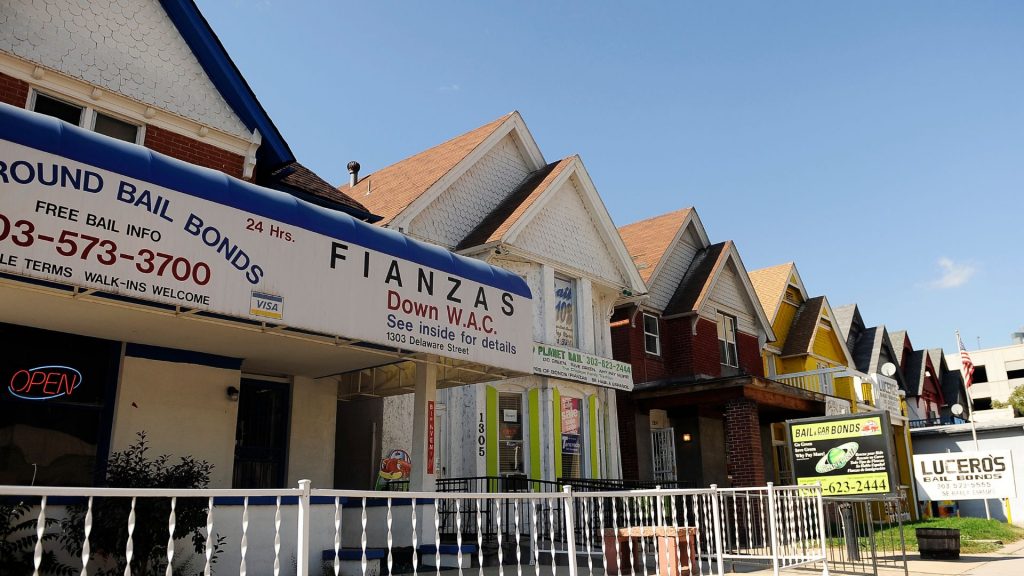Cash bail alternatives clash with Trump’s law-and-order agenda

When Camilla Broderick was arrested for selling drugs, the court set her bail at $2,500. She could walk out of jail before her trial — if she had the cash.
“I was able to pay bail because my dad ran to the bank and forked over $2,500,” she told Straight Arrow News. “I benefited because my parents could afford it. Otherwise, I would have sat for months.”
Broderick was able to stay out of jail. That is, until she relapsed during a court-ordered drug program. This time, she was sent to New York City’s Rikers Island, one of the country’s most dangerous jail complexes.
At Rikers, as at most jails across the country, the majority of people are incarcerated because they can’t afford their bail, not because they represent a threat to the community or to themselves. They serve as human collateral to ensure they show up for their court date, serving time regardless of whether they ultimately are found guilty or not guilty.
A once-growing movement to transform bail procedures or to do away with cash bail altogether is now under threat, a potential victim of President Donald Trump’s punitive approach to law and order.
Trump signed an executive order in August that aims to withhold funding from states enforcing a cashless bail system.
“Maintaining order and public safety requires incarcerating individuals whose pending criminal charges or criminal history demonstrate a clear ongoing risk to society,” Trump’s order said. “When these individuals are released without bail under city or State policies, they are permitted — even encouraged — to further endanger law-abiding, hard-working Americans because they know our laws will not be enforced.”
While some question if this approach signals the end of efforts to do away with cash bail, others believe it will help protect communities because it keeps potential future convicts off the streets.
However, some argue enforcing a cash bail system does not keep communities safer.
What is cash bail?
The cash bail system is unique to two countries: the United States and the Philippines, which was under U.S. rule from 1898 to 1946.
When a person is arrested and charged, a judge will typically determine an amount of money to be paid to the court so that they can be released until their court date. While the concept of using money — as an alternative to brute force — dates back to medieval England, it was formalized in nineteenth-century America when prisons and jails were built across the nation.
“Bail is fundamentally designed to serve two different purposes,” Zack Smith, a senior legal fellow at the Heritage Foundation, a conservative think tank, told SAN. “Basically, to make sure that people will show when and where they’re supposed to, and then to make sure that if they are released back into the community pending trial, that they won’t pose a danger.”
Judges traditionally have made two key determinations when considering whether to release a defendant awaiting trial — often a period of months, if not years.
“What has happened in most states is cash bail has been serving as a proxy for those two determinations,” Smith said. “Is there cash bail sufficient to make sure they’ll show up and that they won’t pose a danger? It’s an imperfect proxy.”
Many critics of the cash bail system complain that even dangerous people are released back into communities so long as they have money.
“Each state’s bail laws vary,” Smith said. “The problems that we talk about when we talk about states eliminating cash bail, what many of those states are really doing is making it difficult, if not impossible, to let judges consider those two factors. … For example, New York and Illinois, which have passed very progressive bail reform laws, have defined that dangerous prong so narrowly that it would be almost impossible to tell that that person would pose a danger.”
‘Two-tiered’ justice
With the median bail for a felony now at $10,000, the cash bail system faces widespread scrutiny and criticism.
Some say it perpetuates classist or racist practices.
“Cash bail creates a two-tiered system of justice,” Nicole Zayas Manzano wrote for the Bail Project. “It splits the criminal legal system into two separate and unequal processes: one for those who have money and one for those who do not.”
Camilla Broderick, who was arrested on drug charges, said cash bail is a major reason the United States has the highest incarceration rate of any democratic nation.
“My personal view is there should be no cash bail, as it acts as just further oppression for the poor,” Broderick, who is now a social worker, told SAN.
Criticism of the cash bail system is bipartisan. Former New Jersey Gov. Chris Christie, a Republican, championed changes to bail practices in the Garden State. The conservative Koch brothers promoted similar efforts nationwide.
Trump and others, however, say eliminating cash bail endangers communities and needs to end.
“I think President Trump’s executive order is designed to push back against the problem in many cities — too many cities — where you have repeat violent offenders … who’ve been accused of violent crimes … to be released back into the communities,” Smith said.
Bail bondshops
For those who can’t afford bail, there is another alternative: bail bondsmen.
Bond shops, usually posted up around courthouses and jails, offer people a way out of jail for a price: the bail bond. People can put down collateral or a percentage of their bail, usually around 10%. This fee, however, typically is nonrefundable, even if the person shows up for their court date.
In exchange, the bail bondsmen assure the court they will pay if the defendant flees.
“In today’s criminal justice system, bail bondsmen continue to play a crucial role,” the website for Texas-based bondsmen EZ Out Bail Bonds says. “When a defendant is unable to afford the full amount of bail set by the court, a bail bondsman can step in. The defendant pays a percentage of the total bail amount to the bondsman, who then provides the full bail to the court as a guarantee. This arrangement allows defendants to secure their release while awaiting trial, reducing overcrowding in jails and maintaining the presumption of innocence.”
But some say the bail bond industry is corrupt, profiting at the expense of community safety or perpetuating a broken justice system.
“The commercial bail industry traps people who cannot afford cash bail premiums in a predatory cycle of debt and incarceration, in the same way that payday loan companies and other predatory lenders make a profit by taking advantage of people who need help affording the necessities of daily life,” Allie Preston and Rachael Eisenberg wrote for AmericanProgress.org.
Change stirs controversy
Several states — among them, New Jersey, Illinois and California — have tried variations of cashless bail or other alternatives to cash bail. But these efforts can be controversial.
“Unfortunately, the discussion around cash bail — whether it’s good or bad — in many states’ legislatures are making it almost impossible to consider that dangerousness factor,” the Heritage Foundation’s Smith told SAN.
Trump’s executive order instructed Attorney General Pam Bondi to provide a list of states and local jurisdictions that have “substantially eliminated cash bail as a potential condition of pretrial release from custody for crimes that pose a clear threat to public safety and order, including offenses involving violent, sexual, or indecent acts, or burglary, looting, or vandalism.” He ordered that the government suspend or terminate federal funding for those jurisdictions.
But Broderick, who experienced the bail system firsthand, believes that just because someone can afford their bail doesn’t mean it will keep society safer.
“I think the obvious example of Robert Durst being able to pay a several million dollar bail to abscond and kill someone, versus Kalief Browder, who sat in jail for years over [allegedly stealing] a backpack, shows that this system doesn’t do what it intends,” she said.
She thinks alternatives to cash bail can serve a better purpose and cause less harm.
“Especially with the advent of advances in tech, we don’t need a bail system,” she said. “It costs a couple of dollars a day to put an ankle monitor on someone, versus hundreds to incarcerate.”
The post Cash bail alternatives clash with Trump’s law-and-order agenda appeared first on Straight Arrow News.





